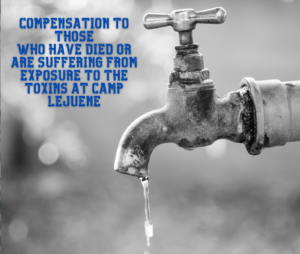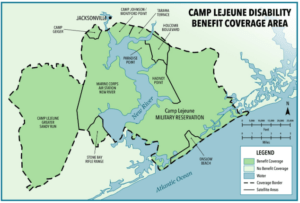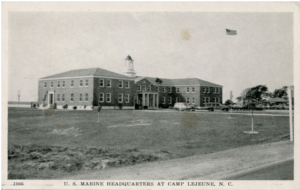
If you or a loved one lived on Marine Corp base, Camp Lejeune, in North Carolina from 1953 and 1987, and developed cancer, blood disorders or female infertility, we have important information to legally safeguard yourself and your loved ones.
Seek Justice from Contaminated Water at Camp Lejeune
The Camp Lejeune Justice Act is poised to pass the U.S. Senate. This legislation will circumvent unacceptable legal loopholes in North Carolina and provide people affected by the Camp Lejeune water contamination with long-overdue access to justice. The Act gives both military families and civilians exposed to the toxic water at Camp Lejeune the right to file a claim for the first time.
Thousands of Veterans and their family members who were unknowingly exposed to benzene, industrial solvents and other harmful chemicals through drinking and bathing in toxic water at the Camp Lejeune military base can file a claim against the U.S. Government. Filing a lawsuit is the only means victims have to obtain the compensation they deserve.

What Was In The Water at Camp Lejeune?
Testing found that drinking water sources at Camp Lejeune were contaminated with benzene, trichloroethylene (TCE), tetrachloroethylene, or perchloroethylene (PCE), and vinyl chloride (VC), all of which are known to be carcinogenic or harmful to humans. A significant portion of this community have suffered severe health consequences, such as cancers caused by exposure to these dangerous toxins.
Who Is At Risk from the Toxic Water?
 More than one million veterans, their families and others who lived and worked at Camp Lejeune in North Carolina from 1953 to 1987 have developed cancers, blood diseases and female infertility resulting from their exposure to the toxic chemicals dumped and leaked into their water.
More than one million veterans, their families and others who lived and worked at Camp Lejeune in North Carolina from 1953 to 1987 have developed cancers, blood diseases and female infertility resulting from their exposure to the toxic chemicals dumped and leaked into their water.
For more than three decades, two of the eight wells at Camp Lejeune were contaminated with harmful chemicals known to cause cancer and other severe illnesses. These wells supplied contaminated drinking water to children at daycare or school, to military families for drinking and bathing, to patients in the hospital, and to military service members and civilian workers in their place of employment.
Until now, it has been difficult to seek compensation for injuries suffered as a result of the contaminated water at Camp Lejeune as North Carolina has a strict law that prevents those harmed from seeking justice in the courts.
However, a new federal bill changes all of that, and gives military veterans, civilians and other personnel exposed to the toxins an opportunity to seek the compensation they deserve. The Camp Lejeune Justice Act removes the statute of repose which essentially prevents anyone injured as a result of the water contamination from seeking redress in the Courts if more than 10 years have passed since the date they were injured.
What Illnesses Are Associated with Camp Lejeune Water Contamination?
The toxic chemicals that contaminated the water at Camp Lejeune have been linked to a number of serious health concerns. Multiple types of cancer are associated with these toxic chemicals, including:
- Kidney cancer
- Non-Hodgkin’s lymphoma (a cancer of the lymphatic system)
- Liver cancer
- Bladder cancer
- Multiple myeloma (cancer of the body’s plasma cells)
- Leukemia (cancer of the blood)
- Brain cancer
- Lung cancer
- Thyroid cancer
- Esophageal cancer
Although cancer is a major concern among those who suffered toxic exposure, it is not the only illness that has been linked to toxic compounds found in the water at the Marine Corp base. Other potential health concerns linked to Camp Lejeune’s decades-long water contamination issues include:
- Parkinson’s disease
- Nephrotoxicity (damage to the kidneys)
- Scleroderma
- Aplastic anemia (a condition where the bone marrow stops producing enough blood cells)
- Myelodysplastic syndromes (MDS) (abnormalities in the body’s blood cell production)
- Hepatic steatosis (fatty liver syndrome)
- Cardiac defects
- Neurobehavioral disorders
Fertility issues and miscarriages have also been linked to the water contamination at Camp Lejeune. In-utero exposure to contaminated water has led to a wide range of birth defects and high rates of childhood cancer. Tragically, many children died very young due to the toxic effects of the chemicals found in the water.

Do You Qualify for a Camp Lejeune Lawsuit?
If you lived on the Camp Lejeune Marine Corp base in North Carolina between 1953 and 1987, for longer than 30 days and have been diagnosed with any of the following symptoms or illness, you may be entitled to compensation for injuries caused by the water contamination at Camp Lejeune.
Qualifying illnesses and diagnoses
- Acute Myeloid Leukemia (AML)
- Bladder cancer
- Brain cancer
- Breast cancer
- Cardiac defect
- Central nervous system cancer
- Cervical cancer
- Epilepsy
- Esophageal cancer
- Fatty liver disease
- Female infertility
- Hodgkin’s lymphoma
- Immune disorders
- Kidney cancer
- Kidney damage
- Leukemia
- Liver cancer
- Lung cancer
- Miscarriage
- Multiple myeloma
- Myelodysplastic syndromes
- Non-Hodgkin’s Lymphoma
- Ovarian cancer
- Parkinson’s disease
- Prostate cancer
- Rectal cancer
- Renal toxicity
- Scleroderma
The personal injury lawyers at Jenner Law have been representing victims of toxic contamination for decades. In conjunction with North Carolina attorneys, we are proud to represent those who were exposed to contaminated water at Camp Lejeune.
